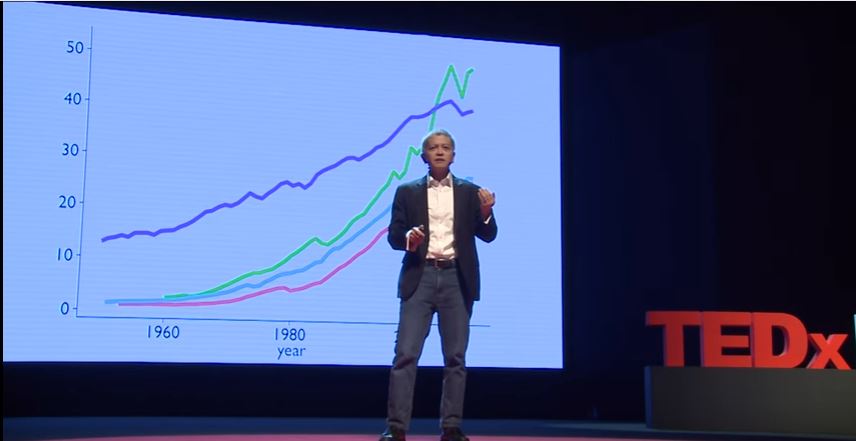
What forces have been responsible for the progress and success of the human society? What changes have occurred in the political and economic landscape that have pulled millions of people out of disease, poverty and hunger? And why have only some
human societies prospered and others have not? Danny Quah, Li Ka Shing Professor of Economics at the Lee Kuan Yew School of Public Policy,in theTedX talk embedded below, highlights four main reasons to rethink that the U.S. led liberal order is not
the only path to human progress:
1.The Big - China, the East
There has been an eastward shift of the economic centre of gravity in the last 35 years, and the trend has been guided by the forces of China and other Asian powers.
Quah studied this shift and mapped how the economic centre point has moved 5000 kilometres, almost three-quarters of the earth's radius, solely pulled by the rise of China and the rest of Asia. If this trend continues, the economic centre of gravity by 2050 will sit on GMT+8, on the border of India and China.
2. The Small - Singapore
This shift is not just governed by the strength of China and its population size. Small nations like Singapore have also contributed extensively to this move. Quah highlights that in the past five years Singapore's per capita income has exceeded that
of the U.S., and Singapore has achieved that without following the U.S. liberal promise. It has functioned on the principle of a responsible state clearing the unhealthy swamp for overall national growth.
3. The Many - Emerging nations
Apart from China and Singapore, there are a multitude of nations outside the Trans Atlantic Axis, which have not followed the example of the liberal promise. These countries have been experimenting with different economic models and political ideas to
succeed in the international community. The result of this experimentation has been that hundreds of these countries which in the 1980s and 1990s made less than a third of the total incomes of the G7 nations plus Japan, have in the last fifteen years
caught up. The liberal promise seems to no longer house the only answer to economic success.
4. The Aware - Who counts
Quah questions, that if the idea of liberal promise as an answer to prosperity was put to vote to people across the world (if the world were a democracy), where would the highest concentration of individuals be? He did the calculation and found that the
smallest circle of the Earth with more people inside than out, would lie around Eastern Myanmar. This circle encompasses the cultural diversity, Asian values and defines the area where the world's basic democratic majority lives. Therefore, individuals
concentrated in this part of Asia would decide the world's future.
These points highlight that nations' success has been a continuation of mixing of ideas and ideologies across the globe. Quah states that the world is not simple and linear, and the opposite of a liberal promise does not mean an authoritarian dictatorship,
but an enlightened collective action. He concludes his talk by re-emphasising the need for countries to be pragmatic, innovative and courageous enough to move away from the security provided by the liberal promise.